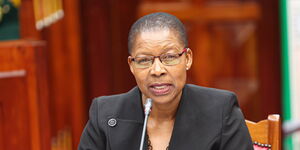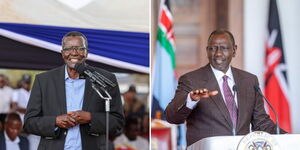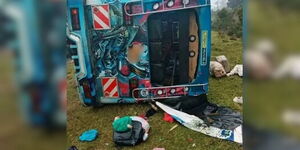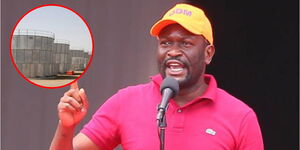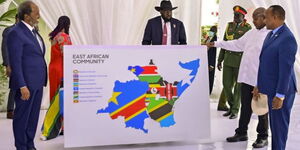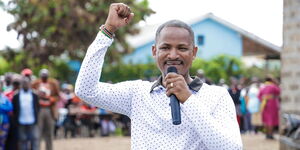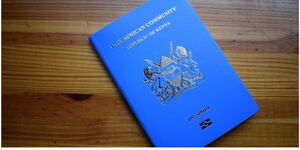Unprecedented occurrences in Kenya's main political parties coupled with a harsh statement from Chief Justice David Maraga have seen President Uhuru Kenyatta thrust into the centre of the debate on whether he is a democrat, as he has previously reiterated, or a veiled dictator.
Chief Justice David Maraga tore into the President at a press briefing on Monday, June 8 when he accused Uhuru of stifling the Judiciary by disobeying court orders and failing to appoint 41 judges, promising Kenyans a build-up of pending cases.
This was followed by Law Society of Kenya (LSK) President Nelson Havi announcing a plan to lobby members of the Senate and National Assembly to impeach Uhuru.
At the same time, allies of Deputy President William Ruto have accused Uhuru of dictatorial tendencies following the ouster of Ruto's allies from key leadership positions in the Senate and National Assembly.
A dictator is defined as someone who rules a country with complete power, has complete control over the armed forces, and destroys any political opposition.
While he has control over the armed forces by virtue of being Commander-in-Chief, whether Uhuru rules with complete power given the checks and balances of the 2010 Constitution, or destroys all political opposition, is up for debate.
Uhuru has championed his credentials as a democrat, and makes no secret of his desire to leave a lasting legacy of national unity through the Building Bridges Initiative (BBI) fronted alongside Orange Democratic Movement (ODM) leader Raila Odinga.
In his Madaraka Day speech on June 1, Uhuru stated that he was discerning a Constitutional moment as part of the expansion of Kenya's democratic space to foster inclusivity and harmony.
"Ten years later, I am already discerning a constitutional moment. Not a moment to replace the 2010 constitution but one to improve on it. A moment that will right what we got wrong in 2010. But fundamentally, the constitutional moment I discern is one that will bring an end to the senseless cycles of violence we have experienced in every election since 1992.
"And one that will deepen our democratic credentials and lead to a much more inclusive society, which, I believe, was the intention of the framers of the 2010 constitution," he stated.
City lawyer Charles Kanjama is among those who added their voices to the debate after Maraga's statement, arguing that Uhuru's proposed constitutional moment held no weight due to the disregard of court orders.
"If President Uhuru ignores court orders, then he lacks moral authority to ask Kenyans to comply with his government's directives. Also, he lacks credibility to discern any constitutional moment or pursue amendments," he stated on Monday, June 8.
On the other hand, members of the Tanga Tanga faction allied to Ruto have accused Uhuru and functionaries around him for employing intimidation, threats and scare tactics to silence any dissent.
Former Senate Majority Leader Kipchumba Murkomen, Susan Kihika, Benjamin Washiali and Cecily Mbarire have been the latest victims of the purge in Jubilee, with the fate of National Assembly Majority Leader Aden Duale said to be hanging in the balance.
Allies of the Deputy President such as Murkomen have, however, also been accused of hypocrisy given their support for previous disregard of court orders by the national government, such as in the case of lawyer Miguna Miguna who was deported to Canada despite the courts ruling against it several times.
"The 2010 Constitution did not anticipate that one man can be the President, Deputy President,CIC, Independent Commissions, DPP, IG, DCI,Chief Justice,Judge, Magistrate, Speaker Senate and NA, MP, Governor, Governor Nairobi and Kiambu, media owner, editor for all media houses all in one," Murkomen wrote of the machinations in government on Monday, June 8.
Speaking to Kenyans.co.ke, renowned political analyst and University of Nairobi don Herman Manyora stated that it was impossible to deem Uhuru a dictator or a democrat from the narrow prism of 2 incidents; disobedience of court orders and removal of Ruto's allies.
He, however, asserted that it was important for critics of the President to be allowed to voice their concerns as their input and involvement grows the democratic space.
"What I think is, you cannot use one or two parameters like disobeying court orders to say that this man is a dictator or a democrat. You have to consider several other elements so I wouldn't call him a dictator.
"But I understand why it is happening, and maybe in some cases, you can say there were excesses. But it is impossible to call him a dictator or democrat based on recent events.
"But I have to say, democracy is a continuous vigil. It requires people to call out the government where they feel things are not right," he stated.

